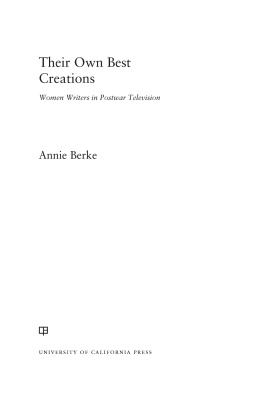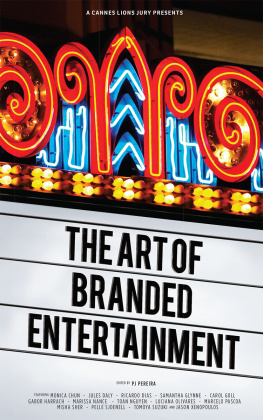Branded Women in U.S. Television
Critical Studies in Television
Series Editor: Mark Andrejevic, University of Iowa
Advisory Board
Robin Andersen, Fordham University
Lynn Schofield Clark, University of Denver
James Hay, University of Illinois at Urbana-Champaign
Fred Turner, Stanford University
This series critically examines television, emphasizing in-depth monographic studies on a particular television series. By looking at television through a critical lens, the books in this series will bring insight into the cultural significance of television and also explore how the lessons apply to larger critical and social issues. The texts in the series will appeal to communication, media, and cultural theory scholars.
Titles in the Series
Branded Women in U.S. Television: When People Become Corporations by Peter Bjelskou
Gossip Girl: A Critical Understanding by Lori Bindig
Dawsons Creek: A Critical Understanding by Lori Bindig
Dear Angela: Remembering My So-Called Life edited by Michele Byers and David Lavery
Tribal Warfare: Survivor and the Political Unconscious of Reality Television by Christopher J. Wright
The CSI Effect: Television, Crime, and Governance edited by Michele Byers and Val Marie Johnson
Popular Culture and the Future of Politics: Cultural Studies and the Tao of South Park by Ted Gournelos
The Surveillance of Women on Reality Television: Watching The Bachelor and The Bachelorette by Rachel E. Dubrofsky
Deconstructing South Park: Critical Examinations of Animated Transgression edited by Brian Cogan
Branded Women in U.S. Television
When People Become Corporations
Peter Bjelskou
LEXINGTON BOOKS
Lanham Boulder New York London
Published by Lexington Books
An imprint of The Rowman & Littlefield Publishing Group, Inc.
4501 Forbes Boulevard, Suite 200, Lanham, Maryland 20706
www.rowman.com
16 Carlisle Street, London W1D 3BT, United Kingdom
Copyright 2015 by Lexington Books
All rights reserved. No part of this book may be reproduced in any form or by any electronic or mechanical means, including information storage and retrieval systems, without written permission from the publisher, except by a reviewer who may quote passages in a review.
British Library Cataloguing in Publication Information Available
Library of Congress Cataloging-in-Publication Data
Library of Congress Cataloging-in-Publication Data Available
ISBN 978-0-7391-8793-7 (cloth : alk. paper) ISBN 978-0-7391-8794-4 (electronic)
 TM The paper used in this publication meets the minimum requirements of American National Standard for Information Sciences Permanence of Paper for Printed Library Materials, ANSI/NISO Z39.48-1992.
TM The paper used in this publication meets the minimum requirements of American National Standard for Information Sciences Permanence of Paper for Printed Library Materials, ANSI/NISO Z39.48-1992.
Printed in the United States of America
Acknowledgments
This book began as a dissertation from SUNY Buffalos American studies department. While writing the dissertation and later this book version, I have relied on family, friends, and colleagues for feed-back and hospitality. I have written at desks and on beds in numerous locations in the United States and Denmark, and several people contributed to its creation - from veritable strangers who enabled me to view this material in new ways, to close friends who stood by me through thick and thin.
I have the privilege of working with an incredible group of academic mentors who all have my deepest gratitude and respect. My dissertation committee consists of Dr. Theresa Runstedtler who has guided my studies since my first year as a doctoral student, and Dr. Cynthia Wu who, like Dr. Runstedtler, gave me the confidence to focus my American studies research on television by showing me how to approach issues of representation in historical and contemporary popular culture. Dr. Robin Andersen is a more recent friend and mentor who kindly agreed to serve on this committee and who contributed crucial guidance and expertise to this project.
The list of people to whom I am indebted is long, but I wish to emphasize just a few names of people who made an immense difference in the creation of this project by commenting on earlier drafts, inviting me into their homes when research or temporary teaching positions turned me into an academic nomad, or by luring me away from the computer with strategic use of good food and great company. To my family, thanks for your love and support through the years. To my New York City family, Ken Nielsen and David Smedley, thanks for your kind hospitality and friendship. To Katie Grennell, Jeffry Iovannone, and Mary McMahon, thanks for making me feel right at home in Buffalo from the moment I arrived. I wish to thank Catherine de Lataulade for providing hospitality when I needed peace and quiet. A big thank you to Pia Bregninge, Manny Ramirez, Marie Andersen, Lars Berg Schovsbo, and Katie Grennell for reading drafts of this project - your feed-back is invaluable, and whether were discussing this project, other pop cultural topics, or the political issue of the day, I look forward to many more discussions in the future. My thanks to my Copenhagen mentors, Russell Duncan and the late Paul Levine - this academic journey started with them, and without their guidance, none of this would have been possible. I am very grateful to Mark Andrejevic for believing in this project, and for guidance along the way. The staff and anonymous readers at Rowman and Littlefield Publishers were also immensely helpful in shaping this book. Lastly, to my partner Lars, life is so much better with you.
Preface
Growing up in Denmark, I enjoyed watching American television shows such as Dynasty and The Cosby Show. I knew then, as I know now, that television cannot be dismissed as an unimportant source of entertainment without cultural significance. While my vocabulary did not include words such as Americanization, soft power, or any terminology from the current transnational wave in academia, I knew that television shows were culturally powerful. Dynasty may not have depicted the lives of most Americans (talk about the one percent), but it certainly occasioned discussions in the media and among my friends and family, about wealth in the United States and its vicarious allure for television viewers. Later in life, I realized that Dynasty was inextricably linked to the 1980s as a reflection of that decades obsession with status and wealth accumulation, and I understood how The Cosby Show provided avenues, in the mainstream, for discussions about race in the United States. Both shows depicted wealthy families whose lifestyles were different from those of most people, yet the power of mainstream entertainment is not its didactic content but rather its complex suggestive narratives that transcend the boundaries of accuracy. I, for one, simultaneously desired and rejected the United States as a concept, based on television programs I watched growing up.
The program that functions as this books empirical nucleus, Bravo TVs reality show The Real Housewives of New York City, also depicts wealthy people engaging in conspicuous consumption. While watching this program (one of my guilty pleasures during my years as a doctoral student), I started thinking about how, in a supposedly classless society and during a recession no less, the shenanigans of a group of rich women could attract my attention, the attention of many of my peers (inside and outside of academia), as well as millions of viewers around the country and the world. The show is part of the successful












 TM The paper used in this publication meets the minimum requirements of American National Standard for Information Sciences Permanence of Paper for Printed Library Materials, ANSI/NISO Z39.48-1992.
TM The paper used in this publication meets the minimum requirements of American National Standard for Information Sciences Permanence of Paper for Printed Library Materials, ANSI/NISO Z39.48-1992.